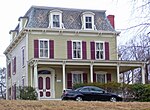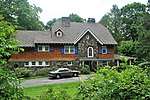Millwood, New York

Millwood is a hamlet and census-designated place located in the town of New Castle, New York, United States in Westchester County. It was originally settled as Sarlesville. The area now known as Millwood appears on 19th century maps as Merritt's Corners (now the intersection of NY 100 and NY 120) and Rockdale Mills (close to what is now the Briarcliff Manor border). As of the 2000 census, the community had a population of 1,210. Miss America 1984, actress and singer Vanessa Williams grew up in Millwood, but lives in New Castle's other hamlet of Chappaqua.Sarles' Tavern, also known as Granite House, was added to the National Register of Historic Places in 1979.
Excerpt from the Wikipedia article Millwood, New York (License: CC BY-SA 3.0, Authors, Images).Millwood, New York
Saw Mill River Road, Town of New Castle
Geographical coordinates (GPS) Address Nearby Places Show on map
Geographical coordinates (GPS)
| Latitude | Longitude |
|---|---|
| N 41.192222222222 ° | E -73.797222222222 ° |
Address
Saw Mill River Road 298
10546 Town of New Castle
New York, United States
Open on Google Maps










